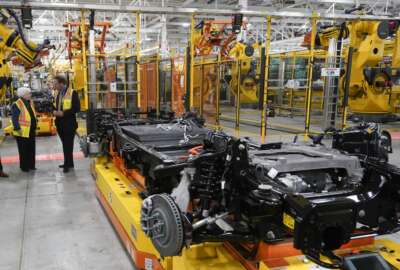
An update on the cars and trucks that’ll be in your agency’s fleet
The Biden administration wants the federal fleet of cars and light trucks to be all electric. Most of the fleet is acquired and managed by a section of the General...
The Biden administration wants the federal fleet of cars and light trucks to be all electric. Most of the fleet is acquired and managed by a section of the General Services Administration. To discuss GSA plans, the Federal Drive with Tom Temin spoke with the acting deputy director of the GSA fleet, Christina Kingsland. And with the assistant commissioner for Travel, Transportation and Logistics in the Federal Acquisition Service, Crystal Philcox.
Interview transcript:
Tom Temin
Give us the state of the GSA fleet, not only how many cars and light trucks, but you have a certain percentage that is electric already. Correct?Crystal Philcox
We do the electric vehicle market is just really taking off. So we’ve got, this year, so far, we have purchased almost 20% of our orders, have been electric. So it’s a huge bump from last year. We want end of the year, probably, that high. But we are really pushing forward to meet industry where they are, and to make sure that we are working with agencies closely, to fulfill their missions, and do that in a way where we can meet the administration’s goal of electrifying the fleet. We were actually at the FedFleet training conference, a couple of weeks ago, in conjunction with the Washington Auto Show. And it was amazing to see all the vendors that were highlighting all of their [Electric Vehicles (EVs)]. So electrification, I think really, is the future.Tom Temin
Safe to say, though, that a lot of the segments are really, not quite fully baked yet. For example, pickup trucks, there are electric ones out there, very expensive, there’s not that much choice. Fair to say that, it’s the sedan really, where it’s the most mature market wise?Christina Kingsland
I’ll jump in here on that one, Tom. The Federal fleet is a working fleet. So we do have a lot of pickups, in the Federal fleet. I would highlight though, that the SUV market and even the minivans, we have quite a few of those in the Federal Fleet. And there are a lot of options, both, in full battery electric and the plug in hybrid [Plug in Hybrid Electric Vehicle (PHEVs)]. So there is some good coverage out there. But of course, there’s still ways to go, to satisfy all the mission requirements of the Federal fleet. And that’s why the administration put the mandate out there for 2027, to give time for the Federal fleet to grow with industry and move into, as new models are available, we’re adopting them early. And by 2027, getting to that 100% of all light duty acquisition, being zero emission vehicles. And 2035, then for all, because there are lots of bus options, as well. We have quite a number of buses in the Federal fleet as well.Tom Temin
Yeah, maybe get one of those flywheel buses from Copenhagen from 1950. I’m just kidding on that one. But with respect to the name plates, there’s a Buy American requirement, does that include a Japanese nameplate, if it’s manufactured, say, in Tennessee or somewhere in the U.S.?Christina Kingsland
So we’re actually from the GSA fleet side of the house, and our purchasing contracts are actually subject to the Trade Agreements Act. So, it’s not quite the same as the Buy American Act. So wherever we have trade agreements with countries. And so, it is a little bit different, but the vast majority of our business, of course, is through the big three U.S. suppliers, and then resellers as well. We have some really good partnerships with American resellers, too.Tom Temin
But if someone wanted something, not a four-door sedan, and not the large black SUV, the Cabinet officials like to be driven around in, they could have, say, a Toyota all-electric SUV, provided it was made on U.S. soil?Christina Kingsland
We do actually have some Toyotas on contract. Through our secondary suppliers, Toyota doesn’t contract with us, directly. But we have U.S. fleet source, who does provide us with some Toyota models today.Tom Temin
And how are the people that drive the cars reacting? Do you get that feedback? Do you look to them, for what they’re thinking about these things?Christina Kingsland
We sure do. So we get a lot of, you know what, it’s the really exciting car right now. So some of these, especially, the new all-electric pickup trucks, folks are really excited to get in them and try them out. Even in our federal law enforcement community, there’s a lot of excitement to get out there and try the Mustang Mach-e, the F-150. Try them in, up that opportunity’s there. We have several LE options in electric, today.Crystal Philcox
I would say that, we’re really listening closely to all the fleet managers out there and to the drivers, to get feedback from them on their experience of transitioning to this new electric fleet. So, very interested in what they have to say, and make sure that we can meet their needs.Tom Temin
We’re speaking with Crystal Philcox. She’s assistant commissioner for Travel, Transportation and Logistics at the Federal Acquisition Service. And with Christina Kingsland, she is acting deputy director of fleet, both at the GSA. And what about the Chargers? The charging situation is really, the more, I guess, logistically, challenging than buying cars themselves. And what’s the status of chargers? Where are they? Are they in all GSA operated facilities or what?Crystal Philcox
We are really pushing charging infrastructure first. It’s absolutely key, to make this whole effort work. And so we’re working closely with agencies, to make sure that they have charging infrastructure in place, that it’s in locations that work for them, that they have ways to pay for that charging, if they’re out and roaming around. And so, really working closely with our agencies on that. I don’t know Christy, if you want to talk about the contracts, a little bit, we have in place.Christina Kingsland
Sure. Our GSA administrator, Robin Carnahan, has really challenged us to be that one stop shop, for charging infrastructure needs. And GSA is, uniquely positioned, to provide that. The Federal Acquisition Service, we have the authority to provide the equipment and ancillary services for charging stations. And then our Public Building Service, the other side to GSA, of course, managing those federal facilities. They have developed IDIQ contracts, available for use for, not just GSA managed facilities, but other agency managed facilities too, to do that design, build construction, that larger construction, and in many cases, is needed for planning out and actually implementing larger charging infrastructure. But then we have like, purchase agreements from the Multiple Award Schedules. Where agencies can come and just buy the equipment itself or consulting support to prepare for that charging long-term. The two together, you can get full service, if you need it from GSA, through PBS, they can provide that project management support, and help you out with all those charging infrastructure requirements, on federal properties. Because, it is important to note that the most charging instances, are going to happen where the vehicle is garaged. So from a federal perspective, we have to prepare for that, so we can operate those electric vehicles.Tom Temin
Yes, because the logistics I imagined vary a lot. I walked to baseball games, and you see down into the garage of the Transportation Department building, down near the ballpark in D.C. And that’s a modern, nice garage, it’s so nice, the floors are painted, etc. That’s an easy place to say, well, let’s take this row and put in chargers. But what about some building out in South Dakota, where everybody parks outside, and it gets to be 15 below, for two months of the year. That’s a different situation to get those cars charged, presuming the people out there want electrics.Crystal Philcox
It is. And when you’re looking at those types of conditions, those very cold conditions, that may not be the most ideal place where you want to have an electric vehicle. Maybe, you want to think through how you’re going to deploy your fleet, if you have offices in those kinds of climates, as well as in warmer climates. And so, that’s why it’s important that we’re working so closely with agencies, because they have such varied missions. Like the Forest Service needs some off-road vehicles, the national parks need buses to carry visitors around. So, lots of different missions out there. And we’re working closely with each agency to make sure that we’re creating a fleet for them, that works for them.Tom Temin
And I have to ask you, just because it’s a personal interest. A lot of agencies, like the Park Service, also have fleets of motorcycles. And the electrics there, that’s a different situation. They don’t go very far. Is that something you’re evaluating? Or have agencies asked you to evaluate those?Crystal Philcox
I know you have a personal interest in motorcycles. I don’t believe we have any of those on contracts, right now. Not to say that we won’t in the future, but not at the moment.Tom Temin
All right. So just a quick question about, again, the big ones. Because, living in D.C. environments, you do see them go by and see people climb in and out of the classic suburban. Are those electric? And can people be served by electric versions of those, if they exist at this point?Christina Kingsland
Certainly, as long as the model is available, whatever the use case is, agencies can make the choice to go electric there. And in some cases, quite a few of the cabinet level secretaries, have chosen to switch to an electric vehicle or their primary vehicle, moving them around. Including our administrator Carnahan, has a couple of electric vehicles that we use in our headquarters.Tom Temin
But are these the magisterial ones that are long and black that, maybe, even have a flag on each fender?Christina Kingsland
Maybe not quite that large, just yet. But I think the industry is going to get there.
Copyright © 2025 Federal News Network. All rights reserved. This website is not intended for users located within the European Economic Area.
Tom Temin is host of the Federal Drive and has been providing insight on federal technology and management issues for more than 30 years.
Follow @tteminWFED




